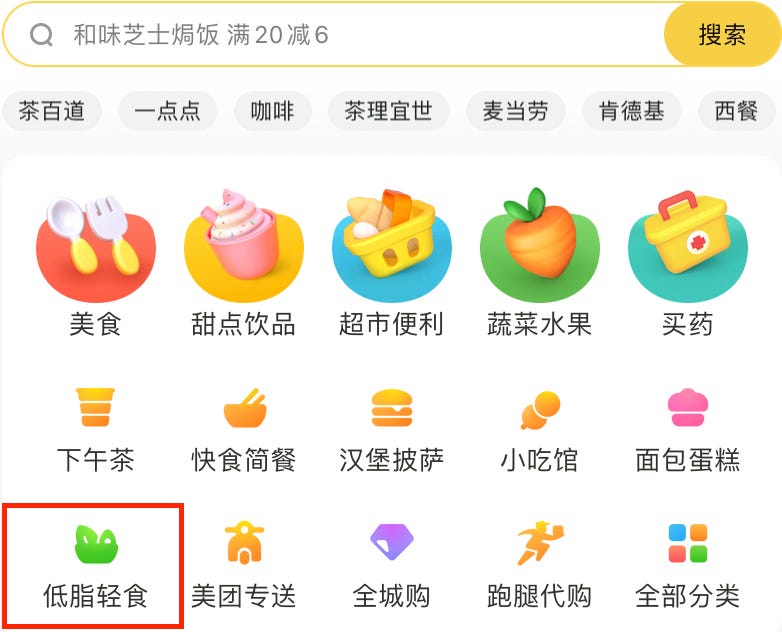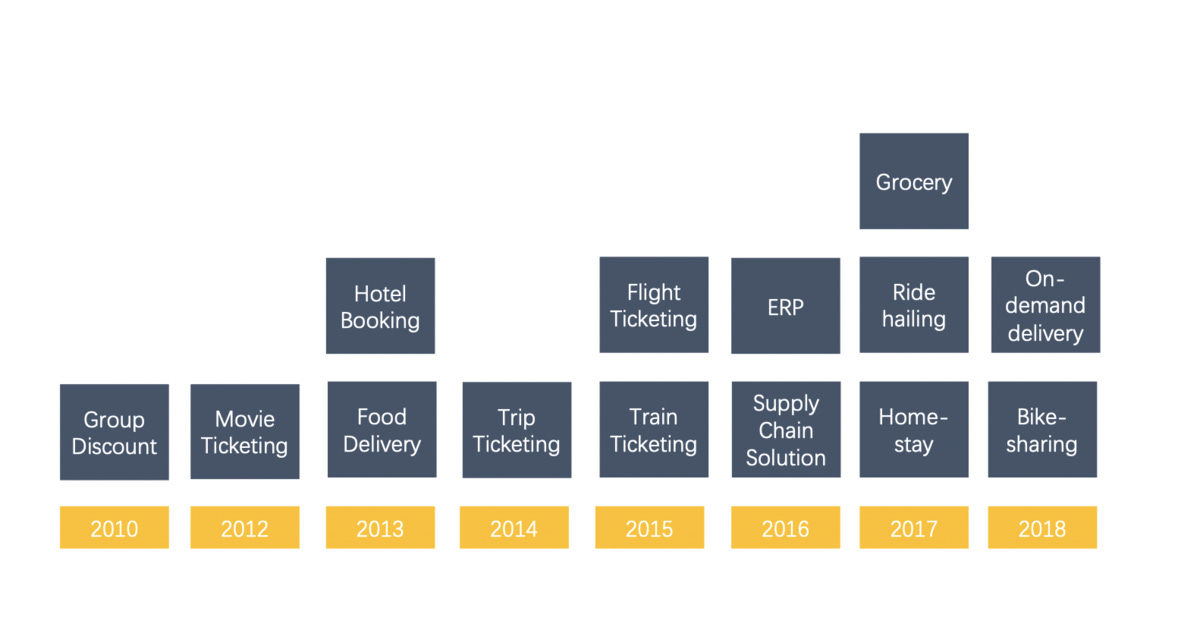Meituan: Food + Platform
My name is Mikal – I’m an early-stage tech investor and I was born in Asia, grew up in Africa and now live in the US. Every week I break down a fast-growing business in an emerging market to understand its product, market and growth strategy.
This week I'm breaking down Meituan.
Meituan is a Chinese “SuperApp,” the leader in the food delivery segment and China’s third most valuable internet company ($250 billlion market capitalization). Meituan is a pioneer in the food delivery industry globally and remains the most innovative company in the sector. Its expansion from food delivery into other higher-value categories is a model being emulated worldwide by the likes of DoorDash, Getir and Deliveroo. Today, Meituan offers everything from in-person booking for restaurants to food delivery and airline ticket purchases.
Founded in 2010, Meituan has grown at extraordinary speed in the last decade:
It generates annual revenues of almost $14 billion today
Serves an impressive 500 million customers across China
Has 6.5 million merchants on the platform
Delivers over 34 million food orders per day across China
Generating annual profits of over $600 million
Even in 2020, where many of Meituan’s business lines were adversely affected by the COVID-19 pandemic, it still managed to grow its overall revenue by 9% in the first half of 2020.
Products
Meituan is a highly complex business and a unique animal, merging elements of Yelp, Groupon, Uber, Doordash and Expedia’s products all together in a single app (see this 5-minute explainer video of the Meituan product). Meituan originally started as essentially the “Groupon for China” in 2010. However, Meituan was not alone in chasing this vision. At the time over 5,000 similar startups were started in China attempting to replicate the Groupon business model. This intensely competitive environment helped hone Meituan’s management and operations ability, allowing it to become the clear winner among its 5,000 competitors and setting it up to become the business it is today.
Today, Meituan offers over 200 different services including:
Maoyan: Buying movie tickets online
Meituan Bike: A bike rental business (formed after the acquisition of MoBike for $2.7 billion)
Waimai: A food delivery service
Meituan Hotels: Incredibly in Q3 2020, Meituan became the largest online platform for hotel booking in terms of room nights according to their third quarter 2020 earnings report
Meituan Grocery: Home delivery of grocery products
Meituan Travel: A service to book plane and train tickets online
Graphic from FHub
Why does Meituan offer 200 different services? In the traditional tech and business methodologies in the Western world, offering so many different services is a recipe for mediocrity and leads to poor investment of resources. In China, the technology ecosystem has evolved differently thanks to the rise of the “SuperApp” culture. This SuperApp philosophy is now inspiring startups across the world from the likes of Jumia to Sea.
Meituan is guided by a strategy it calls “Food + Platform.” Meituan sees its delivery infrastructure and by extension food as the core of its business and a foundation for Meituan to offer a range of value-add services to consumers that are enabled by its core logistics infrastructure.
For example, over the last year Meituan has invested significant time and effort into building out grocery, medicine and flower delivery businesses. These new businesses are built on top of Meituan’s core food delivery infrastructure and quickly achieve scale thanks to Meituan’s existing base of 500 million customers.
Over time Meituan has increasingly branched out into the “personal logistics” space for its consumers allowing consumers to buy plane and train tickets, book hotels and homes to stay at and book tickets for entertainment experiences. Incredibly, in Q3 of 2020 Meituan’s hotel booking service became the world’s largest online platform for hotel booking in terms of room nights - due in part to depressed global travel thanks to COVID-19 and China’s accelerated return to normal relative to the rest of the world.
The guiding focus for Meituan’s Food + Platform strategy is its goal to be the leading ecommerce platform for local services. Meituan aims to be the go-to service for consumers to enjoy their neighborhoods and to explore new ones when traveling. This is a vision DoorDash is emulating very closely in the United States. In fact, the first line of DoorDash’s Q4 2020 Earnings report stated that “DoorDash's mission is to grow and empower local economies.”
Market
Meituan has executed brilliantly over the last few years to become the market leader in food delivery in China, with over ⅔ market share. This is despite competing against food delivery businesses backed by the resources and infrastructure of China’s early tech giants Alibaba (Eleme) and Baidu (Star.ele).
Overall the food delivery market in China was worth about $86 billion in 2019 and grew rapidly in 2020. Meituan estimates that food delivery only accounts for 2.5% of all urban meals consumed in China. The relatively low penetration of food delivery in China is a promising sign for the future growth of the food delivery market and by extension Meituan’s revenues.
Data from FHub
Most excitingly for Meituan are the values of the adjacent markets it has expanded its business into such as grocery delivery ($219 billion by 2026), travel booking ($80 Billion by 2020) and movie ticketing (548m tickets sold in 2020 in China). These expansions significantly increase Meituan’s addressable market and are all sectors that will continue to grow in the decades to come as China becomes wealthier.
Growth Opportunities
Meituan’s Food + Platform strategy has positioned it to be a go-to in every Chinese consumer’s day-to-day life and to continue its rapid growth. Meituan’s focus for the next 12-18 months is continuing its expansion into new delivery business lines - grocery, medicine, flowers and more. The early results in 2020 have been very promising for Meituan, its medicine sales grew 230% year-on-year in Q3 2020 and its flower sales business grew 160% year-on-year in the same quarter.
In the grocery segment, Meituan is experimenting with 3 business models:
Meituan Select: For price-sensitive users in smaller Chinese cities, offering a limited number of high-value products
Meituan Shangou: A marketplace for general grocery products
Meituan Maicai: On-demand delivery of foods, fruits and snacks in 30 minutes
Finally, Meituan is putting significant resources into competing in the community buying market in China. Today, people in neighborhoods in China come together and pool their orders to buy items in bulk online at significant discount. This “community-buying” behavior is growing rapidly and the market is expected to soar past $100 billion in 2021. Meituan has entered this market aggressively and launched in 1000 Chinese cities by the end of 2020. Once again, Meituan’s entry into the sector is a natural extension of its Food + Platform Strategy.
Graphic from Bloomberg
By all accounts, Meituan looks unstoppable. It’s phenomenal ability to execute even despite competition from larger competitors like Alibaba has served it well over the last decade. The one major risk Meituan faces to its continued rapid growth across its product lines is antitrust action by the Chinese government.
The government in Beijing has taken a strong interest in antitrust in 2021 passing new regulations in February. In particular, the Chinese government is looking to crackdown on “platform economies” where businesses assume roles as the market organizer and are able to interfere with the price-setting mechanism. Meituan definitely fits the definition of a platform economy. However, there is limited evidence that it is using its dominance in anti-competitive ways in the market. So far Alibaba has been the main target of antitrust regulators ire and is fighting off a multi-pronged crackdown from the Chinese government.
As Meituan navigates the path forward, antitrust action is the biggest risk to Meituan’s business model and growth in years to come. Meituan is one of the most unique internet businesses in the world. Where companies like Uber, Expedia, Yelp, OpenTable offer one or two services, Meituan has managed to evolve into a SuperApp offering users over 200 different services. This evolution and Meituan’s dominant market share make Meituan a very difficult player to compete against and displace. Will Meituan become a victim of its own success thanks to antitrust enforcement by the Chinese government? Or will Meituan continue its steady ascendancy and rise towards becoming China’s preeminent SuperApp?





